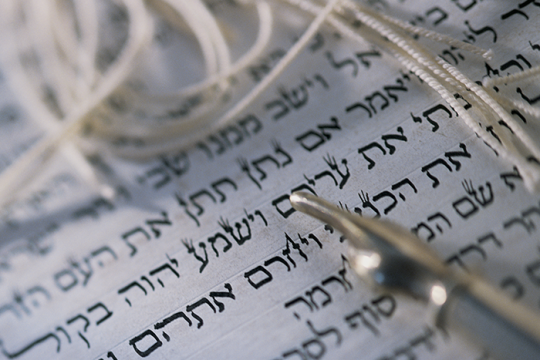By P.J. Schwartz
It's amazing to think that we have reached the end of another year retelling the amazing story of our Jewish people. From B'reshit to D'varim, we have spent each week engulfed in the journey of a people who have emerged into a community committed to the belief in one God who has instilled them with life-long values to live by.
There's something magical about Simchat Torah. We unroll the entire Torah as a community. Hand in hand, we hold the very top pieces of the scroll and generations upon generations look over the parchment only to find the sacred words we have read throughout the year.
Within moments, we come to the end of our Torah narrative, learning that never again does God single out a leader like Moses. I choose to believe that in some respect this statement marks a fitting end to what many biblical scholars refer to as Moses's ethical will, his final words to the people Israel as their leader. What I find so profound is that when we read the last verses of Deuteronomy, I am reminded of when we were first introduced to Moses: this uncertain, conflicted young man who, unbeknownst to him, has a birthright to lead a people to freedom. When he is given this challenge, he at first rejects it and even struggles at expressing his doubt. He needs his brother, Aaron, to serve as his spokesperson. He needs both the comfort and guidance of his family and God to prevail. Yet, it was Moses who was the leader who meets God face-to-face --- panim el panim. Even with all of his imperfections and weaknesses, and despite the fact it was Moses whose actions prevented him from entering the Promised Land, his last words to the Jewish people were God's words. They were reminders for us, as a people, to embrace the values that have been passed from generation upon generation and live up to them. It is Moses who reminds us that we must engage in this dialogue of Jewish tradition that has been going on for so many years.
The dialogue, as we read the last words of Deuteronomy and conclude with the declaration "Chazak, chazak, v'nitchazek - Be strong, be strong, and may we be strengthened - is once again renewed. We are strengthened. We are revitalized. We are inspired to return once more to the beginning and witness the majesty of creation found in Genesis. We recount the world shaping into its beauty, and come to understand that humanity is created b'tzelem elohim, in God's image. Like Moses, who reminds us to live by the values that have been integral to our tradition, it is God who teaches us in Genesis that fundamental to those values is acting in God's image. Striving to be holy and striving to be the best we can be is all God asks from us. It is when we fail to commit ourselves to our best that the covenant is threatened. As a poster in my 6th grade classroom says: "You've got to give it to get it."
On this Simchat Torah, as we read the concluding words of Deuteronomy and the beginning words of Genesis, let us be reminded that the message is clear: Life is a cycle the requires us to be constantly reminded to strive to be the best we can be. We like Moses and our ancestors, are not perfect, but we can overcome those weaknesses and become stronger. We can create ourselves anew and continuously strive for greatness. May each of us, in this 5772, embrace the cycle that awaits us and be inspired by the messages that it teaches.
P.J. Schwartz is a fifth year student at Hebrew Union College-Jewish Institute of Religion in Cincinnati, Ohio. He is married to Michelle Beth Schwartz, a Special Education teacher at Twenhofel Middle School in Kenton County, Kentucky. P.J. has served congregations in Marion, Indiana, Ishpeming, Michigan, and currently is student rabbi at Temple Israel in Marion, Ohio. P.J. is also actively involved as a 6th grade Jewish History teacher and 5th Grade Hebrew teacher at Isaac M. Wise Temple. In addition to his studies at HUC, P.J. is a student member of the National Association of Temple Educators (NATE) and will earn his Master of Arts in Educational Administration, with a Specialization in Jewish Studies in December 2011 as part of a joint program between Xavier University and HUC.
Simchat Torah - personal reflection
By Jason Levine
For Simchat Torah is a remarkable occasion that yearly reminds us about the central importance of the Torah in the life of the Jewish people. There is certainly no lack of hyperbole that describes it as the spiritual core, or historical account, or moral guideline. Yet despite all of this waxing poetic about the Torah, there is an interesting phenomenon that can occur on the bimah. Many people, adults and children alike, are hesitant to come near the open Torah scroll, often prompting the rabbi, cantor, or service leader to warmly beckon to come closer. While our sages spoke of the need to "make a fence around the Torah,"1 they certainly were not referring to this invisible force field that seems to create a barrier between Torah and all of us.
Similar to standing a few feet away from a beautiful piece of art in a museum, one can certainly understand the nervousness of being around such a special and sacred object. But we must fight this urge. Instead, we should draw nearer to it, reaching a level of intimacy with the holy scroll. This closeness is no more evident than in the celebration of Simchat Torah.
During Simchat Torah, we dance and sing with the scroll, filled with jubilation and joy. All of our energy is directed toward the Torah, celebrating it. In many ways, the Torah is like a beloved family member for whom we care and who has been part of family for two thousand years. As we dance, we hold the Torah with the love and affection of a newborn child or the warmth of embracing an old friend with a deep hug. This is the sort of intimate connection we seek with the Torah.
This intimacy is more than physical. For on Simchat Torah, we reflect on the deeper meaning of the Torah and what it means to our Jewish community and to each of us individually. Torah is more than a symbol of Judaism and a connection to history. Torah uplifts each of us. Rabbi Meir teaches that closeness and love of the Torah, and the study of its wisdom, "encloses [us] with humility and awe, makes [us] fit to be righteous, pious, correct and faithful; distances [us] from sin and brings [us] close to merit."2 Therefore, when we celebrate the Torah on Simchat Torah, we are celebrating ourselves and how much we have grown during these past twelve months. Our community rejoices in how the words of Torah have been sweet on our lips and stood as inspiration for us to become stronger and wiser.
Simchat Torah stands as our yearly check-in to see if we have kept up that barrier from the Torah and its transforming power, or if we have continually drawn closer, reaching a deep connection and intimacy. Perhaps that invisible fence has slowly grown larger, almost creating a rift. But this year, as in all years, we will tear it down and draw near to the sacred, holy scroll of our tradition.
"She is a tree of life to those who grasp her, and whoever holds on to her is happy."3
This verse has been used throughout Jewish tradition as a beautiful metaphor for Torah.4 Many are aware to the English adaptation in the popular melody of Eitz Chayim, sung as the Torah is returned to the ark: "It is a tree of life to those that hold fast to it, and all of its supporters are happy."
I hope that this Simchat Torah we let Torah make us happy. It is more than a symbol; it is more than a holy object. It is a dear friend and family member, to whom we cling and draw strength. Hold it near; hug it close. Let it bring you happiness and wisdom as we celebrate Torah and celebrate ourselves.
1 Avot 1:1
2 Avot 6:1
3 Proverbs 3:18
4 In Hebrew, the word "Torah" is a feminine noun, further creating a grammatical connection to this verse.
Jason Levine is a fourth year rabbinical student Hebrew Union College-Jewish Institute of Religion in Cincinnati, Ohio. He is currently serving as the Student Rabbi of the Hillel at Miami University in Oxford, Ohio. Jason is also serving his second term as President of the Rabbinical Student Association in Cincinnati.
Related Posts



